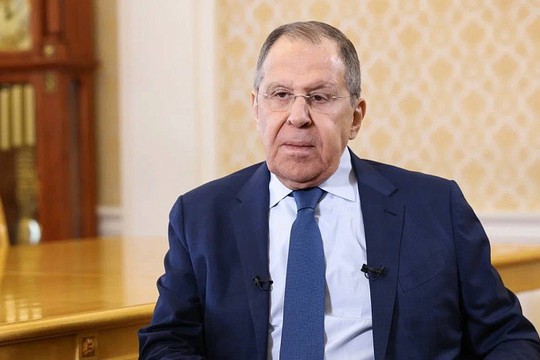Photo: MFA
Foreign Minister Sergey Lavrov’s interview with Voyennaya Priyomka TV programme on the occasion of Rosoboronexport company’s 25th anniversary.
Moscow, November 9, 2025
Question: Over the past 25 years, Rosoboronexport has become a key player in the global arms market. How do Russian arms exports influence the country’s standing in global politics and diplomacy, particularly as regards top-level negotiations?
Sergey Lavrov: The short answer is, they do play a significant role.
We are living in a different era now. Although we often mention that Russia has two allies – its army and its navy, – we obviously need to bolster our aerospace forces as well.
Looking at the situation from a geopolitical perspective, Russia’s involvement in the global struggle for influence, particularly in ensuring fairness in global processes and preventing any single nation from dictating the actions of others, is supported by Rosoboronexport as well as by companies that supply products to international markets through this key intermediary – and act as Russia’s allies in the efforts to democratise international relations. There is no question about that.
Many nations that are breaking free from the historical grip of colonialism have formally gained independence and declared decolonisation – and yet, they still find themselves economically dependent on their former colonisers. As these countries work to fully establish their independence, their primary concern is securing the safety of their nations and citizens as well as maintaining an adequate defence capability. In this regard, our military-technical cooperation and the assistance we provide in helping them establish their fully independent nationhood is crucial. Russia’s position in the world largely depends on the success of these defence partnerships.
Question: Including the effectiveness of Rosoboronexport specialists?
Sergey Lavrov: Absolutely. Rosoboronexport is Russia’s primary supplier to global markets, and it has earned the trust of manufacturers of our military products.
The company has proven its ability to deliver promptly, on time, and provide reliable servicing for the equipment it supplies. The Foreign Ministry has a long-standing, strong relationship with Rosoboronexport, and we have always supported each other. We have never failed each other, and we certainly haven’t let them down.
Question: Military-technical cooperation is often viewed not only as an economic tool but also as a political one. How would you assess its role in building strategic relationships with Russia’s key partners?
Sergey Lavrov: It is fundamental. Military-technical cooperation and the provision of military products is a cornerstone of long-term alliances and strategic partnerships that provide a framework for lasting partnerships. In this regard, it is among primary areas of focus in our work with our allies.
Moreover, the military equipment received through Rosoboronexport by our allies and strategic partners that seek to develop such level of partnerships is not only highly competitive, but has also proven its superiority on the battlefield.
For instance, when Russia was compelled to send a unit of our Aerospace Forces to the Syrian Arab Republic to help combat the ISIS and prevent the impending catastrophe, our troops’ activities on the battlefield and our military equipment were praised by many experts worldwide. Today, during the ongoing special military operation, the effectiveness of our forces is being closely analysed by numerous countries, including those in the West.
This is an important factor in shaping our country’s standing in the global arena, its reputation, and authority.
Question: I would add that arms exports are not just about selling products, like a tonne of potatoes. It is about building long-term relationships, training people, and facilitating a learning process. While cadets study at our military academies, they ultimately become familiar with Russian culture and language. It is a long-term, ongoing story.
Sergey Lavrov: I started with mentioning that this is a long-term, promising aspect of our relations. This is indeed so.
Question: In recent years, Russia has taken efforts to boost its military-technical cooperation with new partners, including countries in Asia, the Middle East, and Africa. What are the prospects for further expanding Russian arms exports, and how does this affect high-level negotiations on the global stage?
Sergey Lavrov: I would not call countries in Asia, the Middle East, or Africa “new” partners for Russia. These are regions that we have long-established relationships with.
Yet, you absolutely right in noting that certain countries that until recently had depended on Western manufacturers have shifted away from them. Observing global developments and ongoing conflicts with various arms used, these states have come to realise that Russian weapons are superior: they are more durable, have demonstrated their advantages over comparable Western arms and systems, and have proven to be more efficient and cost-effective.
For example, now, during Donald Trump’s presidency, there have been many revelations about inefficiencies in the US military-industrial complex and Pentagon military procurement. As I remember, a similar case was observed during his first presidency, such as a $12,000 ladder needed to climb into a fighter jet. These are examples of wasteful spending when so much of the expenditure goes toward administrative or related processes rather than the actual manufacturing of the product.
It is not surprising that during the period when NATO was still a properly functioning organisation and we were working cooperatively with the alliance within the Russia-NATO Council, we engaged in numerous joint projects such as counterterrorism initiatives and collaborative work in Afghanistan. One such project was a NATO-Russia helicopter programme for Afghanistan, where NATO countries, particularly the United States, were seeking to use Russian helicopters for operations in the country. I remember it fairly well. However, when NATO adopted its stance, severing ties and rejecting Russian helicopters, it had to encounter operational difficulties.
read more in our Telegram-channel https://t.me/The_International_Affairs

 13:49 09.11.2025 •
13:49 09.11.2025 •























